Rover unveiled its new “75” model in September 1949, and its appearance caused a sensation. It looked like nothing the company had produced previously, with an enormous trunk and the entire passenger compartment fitted within the wheelbase. Early cars developed the “Cyclops” nickname courtesy of the light located in the grille center, but that feature disappeared in late 1952. This Rover rolled off the line in 1951 but has been in storage since 1959. It is complete and needs a new owner willing to return it to active service. If you feel up for the challenge, the seller has listed it exclusively on Barn Finds Auctions.
There were initial rumors, later confirmed as fact, that Rover developed the 75’s styling from a post-war Studebaker. It caught the public’s attention, courtesy of its enormous trunk, but it brought some innovative features to the market. The company utilized a sophisticated alloy of aluminum and magnesium for the doors, trunk lid, and hood. These components were significantly lighter than steel alternatives, helping to keep the curb weight to a mere 3,260 lbs. This car wears its original Connaught Green paint, and its condition looks remarkably good below the layer of dust. It may be possible to achieve a good presentation with little more than a wash, buff, and polish for those wishing to retain the vehicle as a genuine survivor. There is no evidence of rust, and the underside shots reveal little beyond dry surface corrosion. I can see corrosion on some trim pieces, but nothing appears beyond a trip to the local platers. The glass looks excellent, and it seems this Rover offers the buyer the choice of restoration or preservation.
Rover elected to power its new 75 with a 2.1-liter six-cylinder engine that sent 75hp to the rear wheels via a four-speed manual transmission. The journey down the ¼-mile took 22.2 seconds, but this model’s forte was its ability to cruise all day at 60mph. The 75 may have featured older engineering in some areas, but its engine housed some interesting design characteristics. The aluminum alloy cylinder head was not an innovation, with a limited number of manufacturers using it during this period. However, the chrome cylinder bores were a different story. Various companies used it when producing aircraft and small-capacity engines for chainsaws, but it was innovative when applied to vehicles like the 75. It may sound like an odd choice, but the chrome coating reduced friction significantly and was surprisingly durable. The seller indicates this Rover doesn’t run, and it probably hasn’t since it began hibernating in 1959. I would perform a thorough inspection before hitting the key to confirm the cylinder bores are clean. If they are, revival might be pretty straightforward.
Opening the Rover’s doors, including the ultra-cool rear suicide doors, reveals an interior that could be serviceable with a deep clean. The back seat wears its original upholstery, although a slipcover camouflages the front. The timber dash should be fine after cleaning and conditioning, and the headliner has no visible tears. The wheel wears significant deterioration, but a wrap could make it useable until the new owner sources a replacement. If the new owner elects to perform a retrim, the existing upholstery will serve perfectly as a pattern for producing fresh seat covers and door trims in the material of their choice.
When it was introduced in 1949, the 75 was the only passenger car within the Rover brand. It was later supplemented by models utilizing the same body but with different engine capacities. This one looks like a promising restoration project, and the new owner won’t need to search for parts due to its complete nature. It has sat waiting for sixty-three years to return to our roads, but will you be the person to grant it that wish?
- Location: Junction City, Kansas
- Mileage: 72,760
- Engine: 2.1 Liter Inline-6
- Transmission: 4-Speed Manual
- VIN: 14330847
- Title Status: Clean
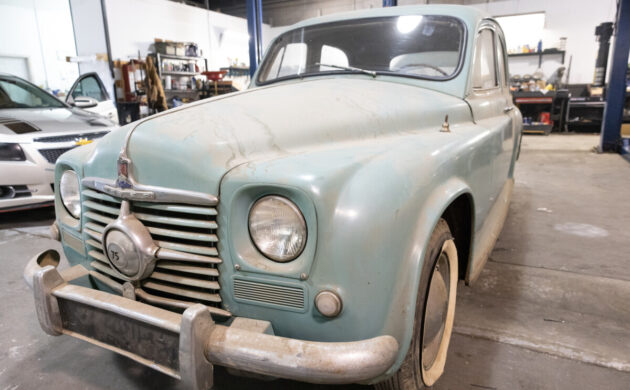
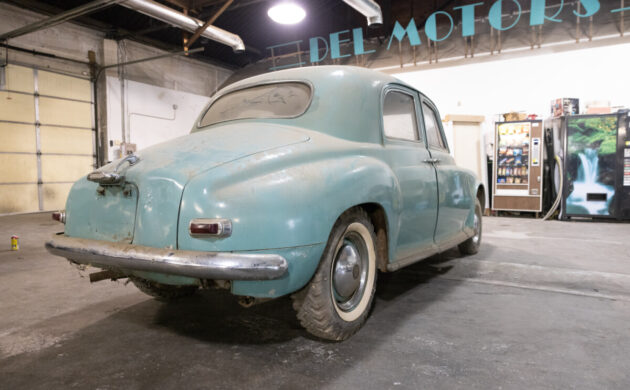
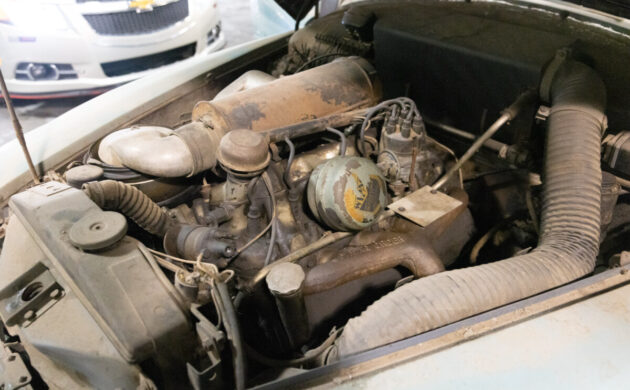
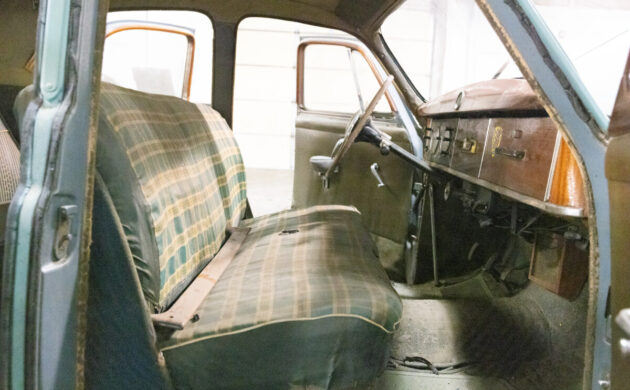
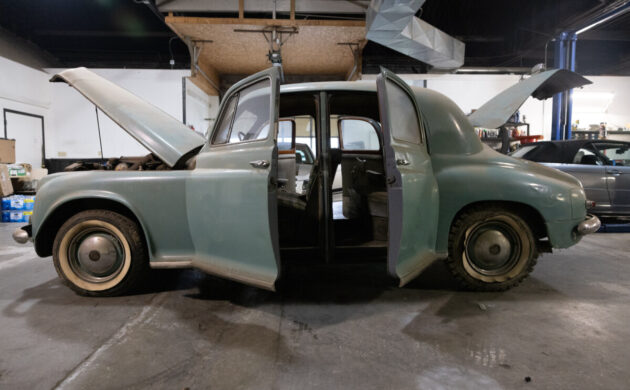
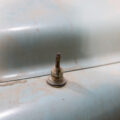
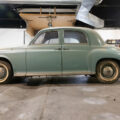
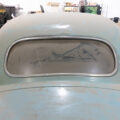
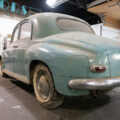
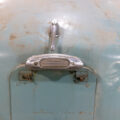
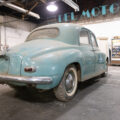
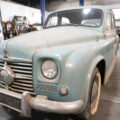
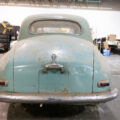
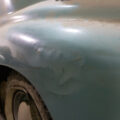

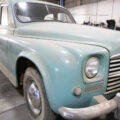
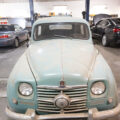

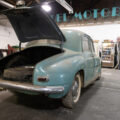
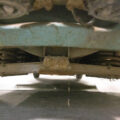
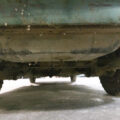
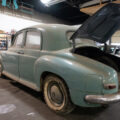
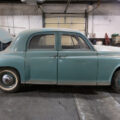
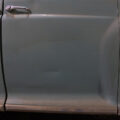
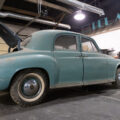
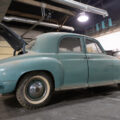
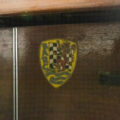

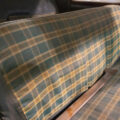
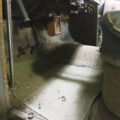
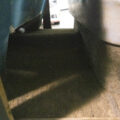

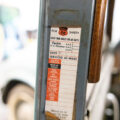
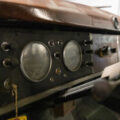
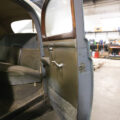
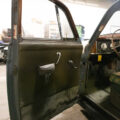
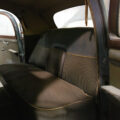
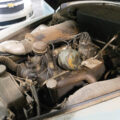
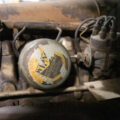
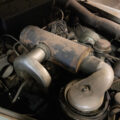
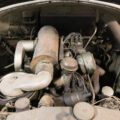
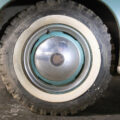
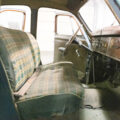
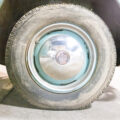
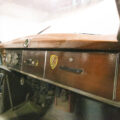


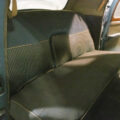
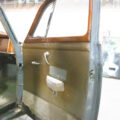
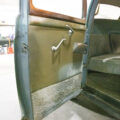
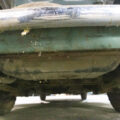
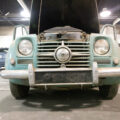
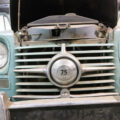

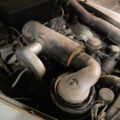
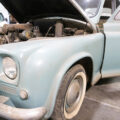
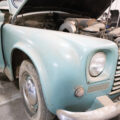
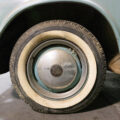
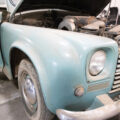
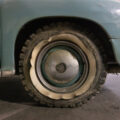
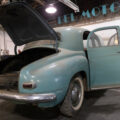
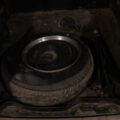
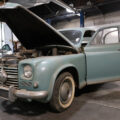
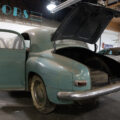
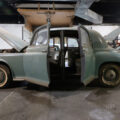
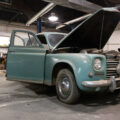
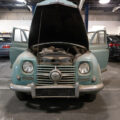



Cute Brit car. Moto Guzzi used chrome plated bores for several years. Now these must be checked for flaking off. Don’t guess investigate! Chips will circulate and clog oil passageways.
This is an upscale car of that era, it SHOULD HAVE LEATHER seats and wilton carpets. They were’t high performance cars but very conservative, quiet, refined transportation for the management class. There is one racing in the GOODWOOD VINTAGE SALOON RACES at Goodwood.com
Michael,
Rover P4 cars sold in the UK and Europe usually had leather interiors. I’ve seen many of them in the UK from my various trips to England. That said I have had 2 LHD versions sold new in North America {1 as a driver, the other was for spare parts], and including this car at auction, I know of 3 others. All had original fabric interiors. I suspect [but have no proof] cars destined for North America were equipped with cloth interiors, as almost all closed cars in America were sold new with cloth interiors.
In the UK Rover cars were known as “The Banker’s Automobile”. Good respectable cars & not flashy, befitting a banker’s status.
All the P4s I’ve ever seen have leather interiors unless they have been reupholstered, including the ones sold new in NA. I’ve owned several. If there were some sold here with cloth, I wonder if it was location-specific or maybe for a specific time period. The model spanned almost fifteen years so maybe there were certain years with cloth. I’ve never heard of this though.
I’ve had several P4s and still have a 1951 which I bought from Australia and had shipped over. It looks very much like this car actually, same color but RHD of course.
The BARC badge on the dashboard is nice.
The comment about the “enormous trunk” is interesting. It’s actually quite small as the spare tire and an upward-sloping floor take up a lot of space and the trunk lid slopes as well. A later restyle included a much more upright rear end treatment, at least in part to improve trunk space.
Thank you so much for the feedback on the trunk comment, That Guy. I probably should have referred to its physical size externally, because it is more prominent than almost anything offered by British manufacturers to that point. I appreciate your comment.
Still an advanced design in ’51. Rover unfortunately didn’t learn their lesson that copying from a fast-moving Detroit led to designs that grew dated long before they could be replaced, not for another two design cycles. That led to the later P4s “Auntie” image alongside the much more distinct and rakish Jaguar sedans.
Jags appealed to buyers who wanted that rakish look, and something different. That was especially true abroad. The Rover sold well in Britain, Commonwealth export markets with a tradition of buying British, and places like the Low Countries and Switzerland with no indigenous auto industry.
It did much worse in Germany, France and above all America where the sort of conservative buyers who might still attracted to the P4 styling later in the ’50s/early ’60s, simply weren’t ready to consider a foreign car.
Interesting car.
I bought my first car in 1973. A 1952 Rover Model 75. I was 17 years old.
I learned a lot from him.
It has a system that until then I had only seen in DKW which is the “free wheel”.
But the gearshift lever (4 speeds) on the steering column was not easy. The first is not synchronized.
The very unique parking brake lever is located on the floor on the driver’s left side.
It was a good school.
Gotta love snow tires! Haven’t seen them in years.
Especially with por ta walls.
Looks like it was originally grey – all the door jambs are grey; an archetypal Rover colour.
The speedometer, switches and indicator lights are the same as my TR3.
What an awesome time capsule. You would be the only one on the block.
A unique auto, but it is going to need a ton of work to make it operational. In the condition it is in the offer of $500 seems to be a fair offer. If the seller isn’t too greedy this might sell fast.
Is this the overhead inlet/side exhaust engine?
Yes, it’s not a hot rod but very smooth. For its era the performance is quite decent actually. Unlike many British and European sedans of the time, a Rover P4 is perfectly happy at freeway speeds. It just doesn’t get there too quickly.
That Guy,
I agree, compared to similar cars, I found them to be very quiet at higher speeds, and easy to drive. I’ve always preferred a Rover to a Jaguar saloon [and I’ve had both]. Have you seen the YouTube video from The Bearded Explorer, where he finds a row of P4, P5, and P6 cars that have rusted so terribly that the wings and doors have actually fallen off onto the ground around the cars?
My absolute favorite Rover was a 100% original type 12 saloon from 1935, I wish I still had it. The only problem I had with that car was all the electrical wiring was covered in black cloth insulation, with matching tiny numbered rings at each end of the wire, and the wires were run thru flexible metal conduit! It took me several weeks of hard work to replace all the wiring.
As for the cloth/leather question, the guy who did most of my interior restorations once told me that similar UK and European cars often came with different types of seat materials, depending on what part of the country the car was destined for. He claimed that in the cold north, fabric was preferred over leather because the fabric quickly warmed up compared to leather when sat upon. He said it was also the same in very hot climates, where the fabric would breathe, and the leather made you sweat more.
Jeep and Willys used that design in the F-head engine
This would have been spec’d and sold by Rootes in the North American Dollar Area (NADA). Rover gave the concession for North America to Rootes as their initial efforts to develop a dealer network paled on what Rootes accomplished. So from 1950-58, Rootes spec’d, sold and serviced the cars. Rootes also had Rover develop the “Canadian spec” Land-Rover, so if the Rover cars were slightly different, it would not surprise me.
Wood I like a car with a wooden dash? Yes I wood!
The reserve is off!
i love the rover too. but i don’t like the driver sideto be right handed.
It is obviously LHD